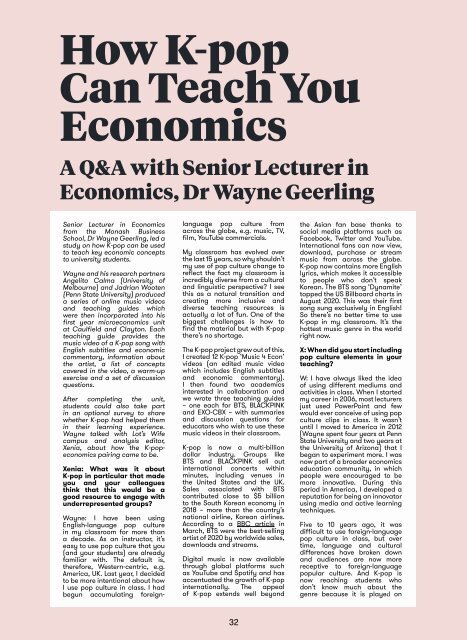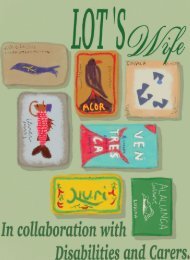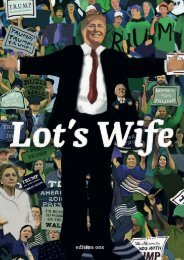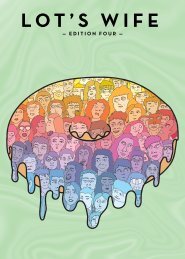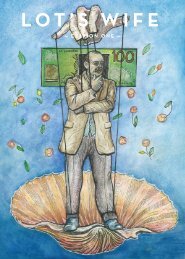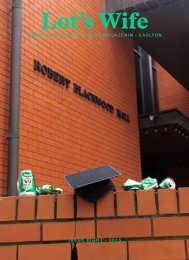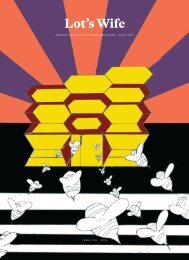Lot's Wife Edition 3 2021
- No tags were found...
Create successful ePaper yourself
Turn your PDF publications into a flip-book with our unique Google optimized e-Paper software.
Lot’s <strong>Wife</strong> • <strong>Edition</strong> Three<br />
Lot’s <strong>Wife</strong> • <strong>Edition</strong> Three<br />
How K-pop<br />
Can Teach You<br />
Economics<br />
A Q&A with Senior Lecturer in<br />
Economics, Dr Wayne Geerling<br />
Senior Lecturer in Economics<br />
from the Monash Business<br />
School, Dr Wayne Geerling, led a<br />
study on how K-pop can be used<br />
to teach key economic concepts<br />
to university students.<br />
Wayne and his research partners<br />
Angelito Calma (University of<br />
Melbourne) and Jadrian Wooten<br />
(Penn State University) produced<br />
a series of online music videos<br />
and teaching guides which<br />
were then incorporated into his<br />
first year microeconomics unit<br />
at Caulfield and Clayton. Each<br />
teaching guide provides the<br />
music video of a K-pop song with<br />
English subtitles and economic<br />
commentary, information about<br />
the artist, a list of concepts<br />
covered in the video, a warm-up<br />
exercise and a set of discussion<br />
questions.<br />
After completing the unit,<br />
students could also take part<br />
in an optional survey to share<br />
whether K-pop had helped them<br />
in their learning experience.<br />
Wayne talked with Lot’s <strong>Wife</strong><br />
campus and analysis editor,<br />
Xenia, about how the K-popeconomics<br />
pairing came to be.<br />
Xenia: What was it about<br />
K-pop in particular that made<br />
you and your colleagues<br />
think that this would be a<br />
good resource to engage with<br />
underrepresented groups?<br />
Wayne: I have been using<br />
English-language pop culture<br />
in my classroom for more than<br />
a decade. As an instructor, it’s<br />
easy to use pop culture that you<br />
(and your students) are already<br />
familiar with. The default is,<br />
therefore, Western-centric, e.g.<br />
America, UK. Last year, I decided<br />
to be more intentional about how<br />
I use pop culture in class. I had<br />
begun accumulating foreignlanguage<br />
pop culture from<br />
across the globe, e.g. music, TV,<br />
film, YouTube commercials.<br />
My classroom has evolved over<br />
the last 15 years, so why shouldn’t<br />
my use of pop culture change to<br />
reflect the fact my classroom is<br />
incredibly diverse from a cultural<br />
and linguistic perspective? I see<br />
this as a natural transition and<br />
creating more inclusive and<br />
diverse teaching resources is<br />
actually a lot of fun. One of the<br />
biggest challenges is how to<br />
find the material but with K-pop<br />
there’s no shortage.<br />
The K-pop project grew out of this.<br />
I created 12 K-pop ‘Music 4 Econ’<br />
videos (an edited music video<br />
which includes English subtitles<br />
and economic commentary).<br />
I then found two academics<br />
interested in collaboration and<br />
we wrote three teaching guides<br />
– one each for BTS, BLACKPINK<br />
and EXO-CBX – with summaries<br />
and discussion questions for<br />
educators who wish to use these<br />
music videos in their classroom.<br />
K-pop is now a multi-billion<br />
dollar industry. Groups like<br />
BTS and BLACKPINK sell out<br />
international concerts within<br />
minutes, including venues in<br />
the United States and the UK.<br />
Sales associated with BTS<br />
contributed close to $5 billion<br />
to the South Korean economy in<br />
2018 – more than the country’s<br />
national airline, Korean airlines.<br />
According to a BBC article in<br />
March, BTS were the best-selling<br />
artist of 2020 by worldwide sales,<br />
downloads and streams.<br />
Digital music is now available<br />
through global platforms such<br />
as YouTube and Spotify and has<br />
accentuated the growth of K-pop<br />
internationally. The appeal<br />
of K-pop extends well beyond<br />
the Asian fan base thanks to<br />
social media platforms such as<br />
Facebook, Twitter and YouTube.<br />
International fans can now view,<br />
download, purchase or stream<br />
music from across the globe.<br />
K-pop now contains more English<br />
lyrics, which makes it accessible<br />
to people who don’t speak<br />
Korean. The BTS song ‘Dynamite’<br />
topped the US Billboard charts in<br />
August 2020. This was their first<br />
song sung exclusively in English!<br />
So there’s no better time to use<br />
K-pop in my classroom. It’s the<br />
hottest music genre in the world<br />
right now.<br />
X: When did you start including<br />
pop culture elements in your<br />
teaching?<br />
W: I have always liked the idea<br />
of using different mediums and<br />
activities in class. When I started<br />
my career in 2006, most lecturers<br />
just used PowerPoint and few<br />
would ever conceive of using pop<br />
culture clips in class. It wasn’t<br />
until I moved to America in 2012<br />
[Wayne spent four years at Penn<br />
State University and two years at<br />
the University of Arizona] that I<br />
began to experiment more. I was<br />
now part of a broader economics<br />
education community, in which<br />
people were encouraged to be<br />
more innovative. During this<br />
period in America, I developed a<br />
reputation for being an innovator<br />
using media and active learning<br />
techniques.<br />
Five to 10 years ago, it was<br />
difficult to use foreign-language<br />
pop culture in class, but over<br />
time, language and cultural<br />
differences have broken down<br />
and audiences are now more<br />
receptive to foreign-language<br />
popular culture. And K-pop is<br />
now reaching students who<br />
don’t know much about the<br />
genre because it is played on<br />
commercial radio. Students<br />
listen to music in their everyday<br />
life, so it’s the ideal medium to<br />
teach abstract ideas..<br />
X: How did you decide<br />
which K-pop songs would<br />
best illustrate the economic<br />
concepts you wanted to<br />
explore during the unit?<br />
W: In this semester, I am using<br />
four K-pop songs in my unit. The<br />
choice is based on two factors:<br />
1. Popularity of the artist.<br />
Students are more likely to<br />
connect with an artist they know.<br />
BTS and BLACKPINK are the most<br />
popular K-pop artists.<br />
2. Use the most suitable song<br />
(English or foreign-language)<br />
to illustrate economic concepts.<br />
This semester, I am using:<br />
• EXO-CBX - ‘Ka-Ching’<br />
(scarcity)<br />
• BTS - ‘No’ (externalities)<br />
• BLACKPINK - ‘Kill This Love’<br />
(sunk costs)<br />
• Yoon Mirae - ‘Flower’<br />
(behavioural economics)<br />
X: How do you think K-pop<br />
can help teach people without<br />
economics backgrounds<br />
about economics?<br />
W: Students with no background<br />
in economics often find it easier<br />
to understand a difficult or<br />
abstract concept through pop<br />
culture than with a graph or a<br />
mathematical explanation.<br />
The importance of using music<br />
to teach economics is well<br />
documented and goes back<br />
to the early 2000s. Music is a<br />
great way of connecting with<br />
students because it taps into<br />
their experience of everyday life.<br />
The K-pop music videos are slick<br />
and regularly set global records<br />
for downloads. The visual<br />
aspect of the music video is as<br />
important as the lyrics. Each<br />
K-pop video I show in class has<br />
the English lyrics and economic<br />
commentary, so students are<br />
able to connect the lyrics with<br />
the themes of the unit.<br />
When you use K-pop and other<br />
music genres in class, you<br />
need to be intentional about<br />
its use to maximise the value.<br />
Playing a song in isolation is<br />
not really useful. I like to use a<br />
warm-up activity, then follow<br />
the music video with questions<br />
and discussion. Having a postactivity<br />
assessment in the form<br />
of a quiz is a great way to see<br />
what students have actually<br />
learned.<br />
X: Why do you think we don’t<br />
see as much international pop<br />
culture being used to teach<br />
economics?<br />
W: Economic educators have<br />
been teaching with pop culture<br />
for decades, but the idea of<br />
using foreign-language teaching<br />
resources to create a more<br />
inclusive and diverse classroom<br />
has only recently been taken up.<br />
In the previous decade, barriers<br />
to consuming foreign-language<br />
media have fallen with the<br />
growth of streaming and the<br />
rise of YouTube (with English<br />
language subtitles). The supply<br />
of available foreign-language<br />
media is growing.<br />
The lack of diverse teaching<br />
materials is now a demand side<br />
issue. Most instructors are still<br />
risk averse. My hope is that this<br />
K-pop project (which includes<br />
teaching guides) will further<br />
reduce the costs of using foreignlanguage<br />
media and allow<br />
instructors to diversify their<br />
curriculum.<br />
I am not advocating for<br />
instructors to restructure their<br />
entire course around K-pop or<br />
foreign-language pop culture,<br />
rather make incremental<br />
adjustments to their existing<br />
pedagogical approach. The<br />
progression towards using more<br />
foreign-language clips in the<br />
classroom should be a gradual<br />
decision based on marginal<br />
analysis.<br />
X: Is there another pop culture<br />
medium that you think would<br />
help teach economics and that<br />
you might research more into<br />
in the future?<br />
I see the use of foreign-language<br />
pop culture as a new frontier in<br />
teaching. I’m open-minded about<br />
what I use in my classroom. I am<br />
often guided by my students and<br />
other academics who share new<br />
ideas. My most recent project<br />
uses media from across the globe<br />
to teach economics (11 teaching<br />
guides from 11 different countries<br />
to explain 11 different economics<br />
concepts).<br />
You can go onto the Lot’s <strong>Wife</strong><br />
website for bonus interview<br />
material.<br />
Wayne’s K-pop research has<br />
been accepted for publication<br />
by the International Review of<br />
Economics Education. You can<br />
read the draft manuscript at:<br />
https://dx.doi.org/10.2139/<br />
ssrn.3732471<br />
If you have any pop culture<br />
suggestions for Wayne, you can<br />
contact him at wayne.geerling@<br />
monash.edu<br />
32 33<br />
Art by Linda Chen


